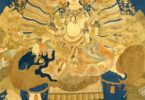《百喻经》
[The] Sūtra [Of A] Hundred Parables
(三九)见他人涂舍喻
(39) Parable [Of] Seeing Another Person Applying [On His] House
昔有一人往至他舍,见他屋舍墙壁涂治,其地平正清净甚好,便问之言:「用何和涂得如是好?」
[In the] past, [there] was a person [who] went [to and] arrived [at] another’s house. Seeing [the] other’s house’s walls applied [and] treated, [with] its floor even [and] straight, pure [and] clean, [looking] extremely beautiful, [he] then asked him, saying, ‘[You] used what mix [to] get [them] thus beautiful?’
主人答言:「用稻谷䴬水浸令熟,和泥涂壁故得如是。」
[The] owner replied, saying, ‘[I] used rice grains [and] husks, [in] water immersed [to] make [them mixed] thoroughly, and [with] mud applied [them on the] walls, [to] get [them to be] thus.’
愚人即便而作念言:「若纯以稻䴬不如合稻而用作之,壁可白净泥始平好。」
[The] foolish person immediately then had [this] thought, saying, ‘If purely with rice husks, [this is] not as good as combining [with] rice [grains] then using it, [as the] walls can [be more] white [and] pure, [with the] mud then even [and] beautiful.’
便用稻谷和泥用涂其壁望得平正,返更高下,壁都劈裂。
Then using rice grains and mud, using [them to] apply [on] his walls, hoping [to] get [them] even [and] straight, instead [with] even [more] highs [and] lows, [with the] walls all splitting open.
虚弃稻谷都无利益,不如惠施可得功德。
In vain wasting rice grains, all without benefits, [this is] not as good as [for] benefitting giving, [that] can attain meritorious virtues.
凡夫之人亦复如是,闻圣人说法修行诸善,舍此身已可得生天及以解脱,便自杀身望得生天及以解脱,徒自虚丧空无所获,如彼愚人。
Of ordinary beings’ people, [they are] likewise thus, hearing noble persons speaking [the] Dharma [on] cultivating practices [of] all good, [that with] relinquishing [of] this body already, [there] can [be] attainment [of] births [in] heavens, and with [this have] liberation, then killing themselves, hoping [to] attain births [in] heavens, and with [this have] liberation, in vain losing [their lives], empty without that obtained, [they are] like that foolish person.
[Note 1: What can be used as food should not be wasted for personal vain efforts. If there is excess food, it should be offered for others who need it.]
[Note 2: Although creating much good karmas (善业) can lead to heavenly rebirths, whether there is progress towards liberation (解脱) from there will depend on whether there is further cultivation for purification or not.]
[Note 3: It is possible to spiritually retrogress (退转) in most heavens, and even fall from them when past good karmas are exhausted. It is thus safer and easier to practise sincere mindfulness Buddha (念佛) to reach Pure Land (净土), where there will definitely be non-retrogressive progress towards Buddhahood.]
[Note 4: Those foolish might shortsightedly look only at later conditions of effects, and mistake them as their primary causes. Thus might the foolish deludedly think death is the cause for having a heavenly rebirth, when the actual cause is the earlier creating of much good karmas.]
[Note 5: Suicide not only does not lead to a heavenly rebirth, as taking a human life creates much evil karmas (恶业), it might even lead to a hellish rebirth, much less to liberation.]
Namo Amituofo : Translation and notes by Shen Shi’an
上个喻
Previous Parable:
饮木筩水喻
[38] The Parable Of Drinking The Wooden Bucket’s Water
https://purelanders.com/2023/08/24/38-the-parable-of-drinking-the-wooden-buckets-water-from-the-sutra-of-a-hundred-parables
下个喻
Next Parable:
治秃喻
[40] The Parable Of Curing Baldness
https://purelanders.com/2023/08/31/40-the-parable-of-curing-baldness-from-the-sutra-of-a-hundred-parables
全百喻
All Hundred Parables:
https://purelanders.com/baiyu





